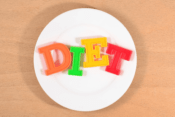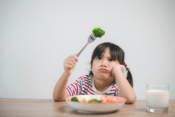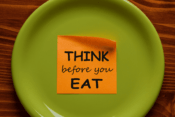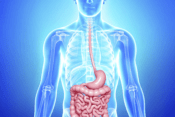
Breaking the Cycle of Guilt and Shame Around Food
Have you ever found yourself standing in front of the fridge at midnight, munching on a treat you’d promised yourself not to touch? As the sweetness fades, guilt and shame creep in, making you feel weak for ‘giving in.’ Sometimes the guilt doesn’t even set in until minutes or hours later, when it hits you that you’ve broken a streak you’d maintained for days or even weeks—and then comes the shame. This is a familiar story for many, part of a larger cycle of food guilt that affects millions of people
Food is a source of nourishment and joy, yet in our diet-obsessed culture, it’s often tied to feelings of guilt, self-judgment, and restriction. Research from the National Eating Disorders Association reveals that 70% of individuals have negative thoughts about food, weight, or appearance at least once a day. This prevalent mindset can lead to unhealthy relationships with food, creating a vicious cycle that impacts our mental and physical well-being.
In this post, we’ll explore how to break the cycle of guilt and shame around food. Drawing from expert opinions, recent studies, and practical strategies, we’ll help you create a healthier, more joyful relationship with eating.
Why Do We Feel Guilty About Food?
Food guilt is rooted in societal norms and diet culture, which often encourage an unhealthy view of body image and self-worth. According to Dr. Evelyn Tribole, a dietitian and co-author of Intuitive Eating, restrictive diets and labeling foods as “good” or “bad” reinforce feelings of guilt when people “break the rules.” This restrictive mindset can fuel cycles of bingeing and emotional eating.
A study from the Journal of Obesity found that labeling food with moral values (like “clean” or “cheat”) makes people more likely to feel guilty about consuming them. This mindset, coupled with cultural pressures to conform to certain body standards, makes it challenging for people to enjoy food without feeling judged, even by themselves.
The Impact of Food Guilt and Shame on Health
The cycle of food guilt goes beyond discomfort; it can actually lead to negative physical and mental health effects:
Increased Anxiety: Guilt and shame about food can lead to feelings of anxiety. Research published in Health Psychology highlights that individuals who experience food-related guilt often have higher levels of stress, which can, ironically, trigger further emotional eating.
Disordered Eating Patterns: Food guilt is a known contributor to disordered eating behaviors, including restrictive eating, binge eating, and yo-yo dieting. This restrict-binge cycle impacts metabolic health and can cause weight fluctuations, as noted by the American Psychological Association.
Decreased Self-Worth: When we tie our self-worth to our food choices, we give food control over our confidence and self-esteem. In the long run, this undermines our ability to appreciate and care for ourselves, which is essential for long-term health and well-being.
Expert Insights on Building a Healthy Relationship with Food
1. Challenge Food Labels and Rigid Diet Rules
Dr. Tribole and Dr. Elyse Resch, authors of Intuitive Eating, recommend moving away from categorizing food as “good” or “bad.” They encourage an approach that sees food as fuel and enjoyment without attaching moral value to eating choices. According to their intuitive eating framework, allowing yourself to eat a variety of foods without judgment helps normalize eating habits and reduces the desire to “cheat” on diets.
2. Cultivate Mindful Eating Habits
Mindful eating is a practice grounded in paying full attention to the act of eating and noticing your body’s hunger and fullness cues. A study from Harvard Medical School suggests that mindful eating can decrease emotional eating and reduce binge episodes. Mindful eating involves:
Savoring each bite and paying attention to taste, texture, and smell.
Eating without distractions, such as phones or TV.
Recognizing your body’s hunger signals and stopping when full.
3. Embrace Self-Compassion Over Judgment
Practicing self-compassion is key to breaking the food guilt cycle. Dr. Kristin Neff, a psychologist known for her work on self-compassion, explains that self-compassion involves treating ourselves with kindness and understanding rather than harsh self-criticism. When we adopt a self-compassionate mindset, we’re better able to forgive ourselves for perceived “mistakes” and move on without lingering guilt.
Practical Steps to Break the Cycle of Food Guilt and Shame
Breaking free from food guilt isn’t about adopting a new diet; it’s about cultivating a balanced, sustainable relationship with food. Here are practical tips to help:
1. Practice Food Neutrality
Food neutrality means seeing food simply as food, without assigning moral value. Instead of labeling foods as “bad” or “cheat meals,” remind yourself that all foods can fit into a balanced diet. Allow yourself to enjoy a variety of foods while focusing on balance, variety, and moderation.
2. Reframe Negative Thoughts
Challenge guilt-inducing thoughts by questioning their validity. For instance, if you catch yourself thinking, “I’m bad for eating this,” replace it with, “Eating this food doesn’t define my worth or health.” This mental shift is small but powerful and can help change how you view food over time.
3. Set Realistic Health Goals
Rather than focusing on weight loss as a primary health goal, consider setting goals around behaviors that foster well-being, such as regular movement, stress management, and balanced meals. Studies show that behavior-focused goals are more sustainable than weight-focused goals.
4. Avoid Restrictive Dieting
Research shows that restrictive diets often lead to binge eating, food obsession, and loss of control. Instead, prioritize a balanced, nutrient-rich approach to food, where you aim to eat a mix of carbs, protein, and fats without rigid rules. Allowing yourself to eat a range of foods lessens the “forbidden fruit” effect that often leads to guilt.
5. Build a Supportive Environment
Seek support from friends, family, or a counselor who understands and encourages a healthy relationship with food. A registered dietitian or therapist trained in eating psychology can offer guidance and support as you work to unlearn ingrained beliefs about food.
The Science of Intuitive Eating
Intuitive eating has gained traction in recent years, backed by a growing body of research demonstrating its positive effects on both mental and physical health. According to a 2023 study published in the Journal of the Academy of Nutrition and Dietetics, individuals practicing intuitive eating report higher satisfaction with food, improved body image, and better mental health outcomes.
Building a New Relationship with Food
Reframing how you view food is a journey that takes patience and self-awareness. Embracing a guilt-free relationship with eating requires you to let go of diet culture’s expectations and focus instead on what genuinely nurtures and fuels you.
Consider taking the first step by choosing one or two strategies from this list. Remember, progress in creating a healthier relationship with food is not linear—it’s a journey. As you continue, you’ll notice an increase in self-compassion and a reduction in guilt around eating.
Key Takeaways
Food guilt is fueled by diet culture and restrictive food labels.
Mindful eating, food neutrality, and self-compassion are essential tools to combat guilt and shame.
Setting behavior-focused goals and building a supportive environment are powerful steps toward healing your relationship with food.
Expert opinions and recent studies support the benefits of intuitive eating and self-compassion for healthier mental and physical outcomes.
End of Blog Post Citation:
Tribole, E., & Resch, E. (2020). Intuitive Eating: A Revolutionary Anti-Diet Approach. St. Martin’s Essentials.
Neff, K. (2011). Self-Compassion: The Proven Power of Being Kind to Yourself. William Morrow Paperbacks.
Journal of the Academy of Nutrition and Dietetics. (2023). Intuitive Eating and Mental Health Outcomes.












